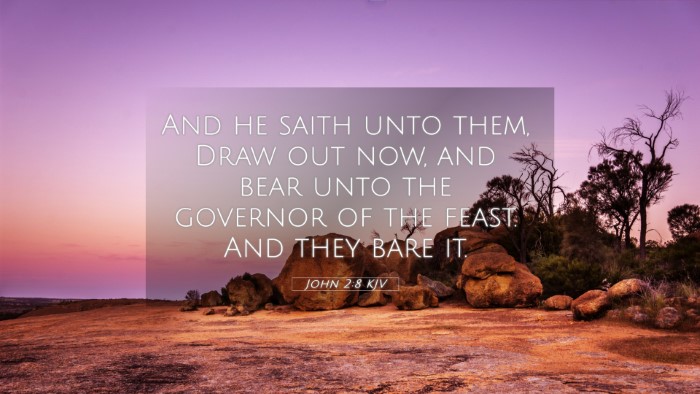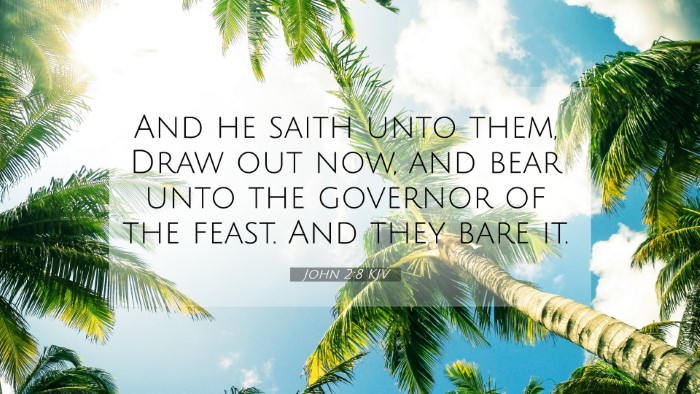Old Testament
Genesis Exodus Leviticus Numbers Deuteronomy Joshua Judges Ruth 1 Samuel 2 Samuel 1 Kings 2 Kings 1 Chronicles 2 Chronicles Ezra Nehemiah Esther Job Psalms Proverbs Ecclesiastes Song of Solomon Isaiah Jeremiah Lamentations Ezekiel Daniel Hosea Joel Amos Obadiah Jonah Micah Nahum Habakkuk Zephaniah Haggai Zechariah MalachiJohn 2:8 Similar Verses
John 2:8 Cross References
And he saith unto them, Draw out now, and bear unto the governor of the feast. And they bare it.
Uncover the Rich Themes and Topics of This Bible Verse
Listed below are the Bible themes associated with John 2:8. We invite you to explore each theme to gain deeper insights into the Scriptures.
John 2:8 Cross Reference Verses
This section features a detailed cross-reference designed to enrich your understanding of the Scriptures. Below, you will find carefully selected verses that echo the themes and teachings related to John 2:8 KJV. Click on any image to explore detailed analyses of related Bible verses and uncover deeper theological insights.
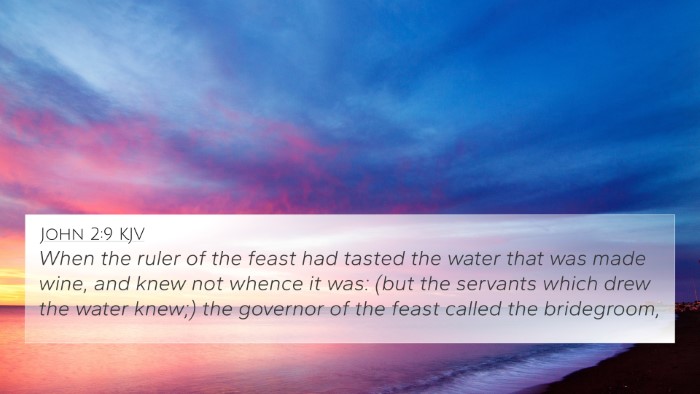
John 2:9 (KJV) »
When the ruler of the feast had tasted the water that was made wine, and knew not whence it was: (but the servants which drew the water knew;) the governor of the feast called the bridegroom,
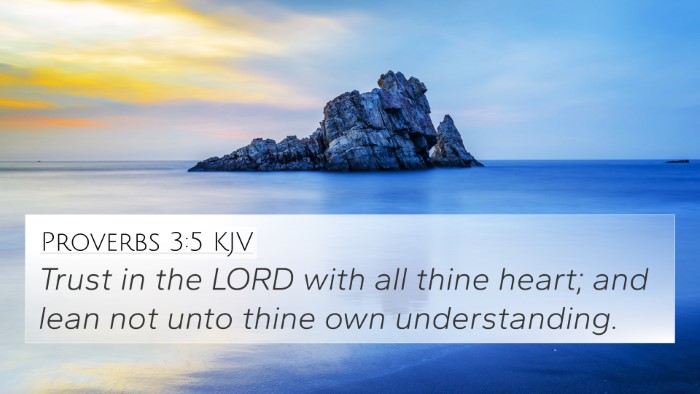
Proverbs 3:5 (KJV) »
Trust in the LORD with all thine heart; and lean not unto thine own understanding.
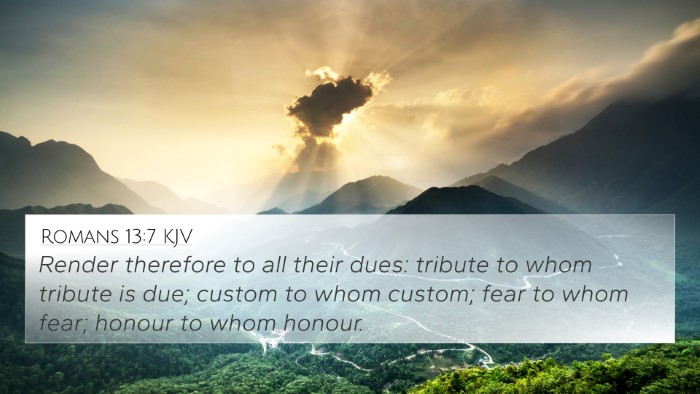
Romans 13:7 (KJV) »
Render therefore to all their dues: tribute to whom tribute is due; custom to whom custom; fear to whom fear; honour to whom honour.

Ecclesiastes 9:6 (KJV) »
Also their love, and their hatred, and their envy, is now perished; neither have they any more a portion for ever in any thing that is done under the sun.
John 2:8 Verse Analysis and Similar Verses
Understanding John 2:8
In John 2:8, we find a significant moment during the wedding at Cana where Jesus performs His first miracle by turning water into wine. This verse states: "And he saith unto them, Draw out now, and bear unto the governor of the feast. And they bare it." This command highlights several themes important to understanding the context, purpose, and nature of Jesus' ministry.
Summary of Commentary Insights
The insights from public domain commentaries—including those by Matthew Henry, Albert Barnes, and Adam Clarke—reveal profound meanings behind this scripture.
Matthew Henry's Perspective
Matthew Henry emphasizes the miraculous provision of Jesus and the benevolence of His ministry. The water that was transformed into wine symbolizes the transition from the old covenant to the new, as wine is often associated with joy and festivity in the Bible. Henry notes that Jesus was mindful of the needs of the host and the guests, showing that His miracles were invoked by human need, aligning with God's divine purpose.
Albert Barnes' Insights
Albert Barnes explains that the command to 'draw out' signifies a participatory act of faith. By instructing the servants to serve the wine to the governor, it illustrates how believers are often called to action in faith. This miracle not only represents Jesus' divine authority but also acts as a symbol of the spiritual renewal He offers. Barnes also connects this act to the broader theme of Jesus being the source of true joy and abundance.
Adam Clarke's Analysis
Adam Clarke elaborates on the significance of the ' governor of the feast.' He indicates that offering the wine to the head of the feast exemplifies social order and respect, but also draws a parallel to Jesus providing understanding and wisdom. This act not only serves the physical need but also reinforces the theme of Jesus as an inextricable link between heaven and earth—blessing both spiritual and earthly provisions.
Thematic Connections in John 2:8
This passage can be explored through several interconnected themes that bind the Scripture together.
- Miracles as Signs: The miracles of Jesus often point to His divine nature and authority.
- Faith and Obedience: The servants demonstrate faith by following Jesus’ command without understanding the miracle behind it.
- Joy and Celebration: Wine in biblical literature often symbolizes life’s joy, reflecting Jesus’ purpose to bring abundant life.
- Transformation: The transition from water to wine signifies transformation through Christ.
- Provision: This miracle illustrates God's provision for physical and spiritual needs.
Connections to Other Bible Verses
John 2:8 can be connected to various other Bible verses that reflect its themes:
- Luke 5:37-38: "And no man putteth new wine into old bottles; else the new wine will burst the bottles, and be spilled, and the bottles will perish." - Emphasizing the new nature of Jesus’ ministry.
- John 4:14: "But whosoever drinketh of the water that I shall give him shall never thirst..." - Highlighting spiritual quenching through Christ.
- Matthew 26:29: "But I say unto you, I will not drink henceforth of this fruit of the vine, until that day when I drink it new with you in my Father's kingdom." - Linking wine with the future joy found in God's kingdom.
- Isaiah 25:6: "And in this mountain shall the Lord of hosts make unto all people a feast of fat things, a feast of wines on the lees..." - A prophetic image of abundance in God’s kingdom.
- John 10:10: "I am come that they might have life, and that they might have it more abundantly." - Reflecting the theme of abundance brought by Christ.
- 1 Corinthians 11:25: "After the same manner also he took the cup, when he had supped, saying, This cup is the new testament in my blood..." - Communion references to Jesus’ blood signifying the new covenant.
- Psalm 104:15: "And wine that maketh glad the heart of man..." - Affirming wine as a symbol of joy given by God.
Exploring Cross-References in Depth
When conducting a comparative Bible verse analysis, cross-referencing John 2:8 with related passages can deepen understanding. Utilizing tools for Bible cross-referencing, scholars and individuals can explore the links between the Old and New Testament revelations.
For anyone interested in finding cross-references for this verse, consider examining:
- Citing how Old Testament prophecies relate to the new workings of Jesus.
- Identifying the thematic connections in biblical narratives about hospitality.
- Investigating the parallel accounts in the synoptic Gospels.
Conclusion
John 2:8 serves as a pivotal point in understanding Jesus' miraculous beginnings. Through the combined insights found in public domain commentaries, one can appreciate the interweaving themes of faith, transformation, and divine provision. The connections between this verse and others throughout the Scriptures encourage readers to explore deeper into the cross-referencing biblical texts to uncover a more comprehensive understanding of God's message.

